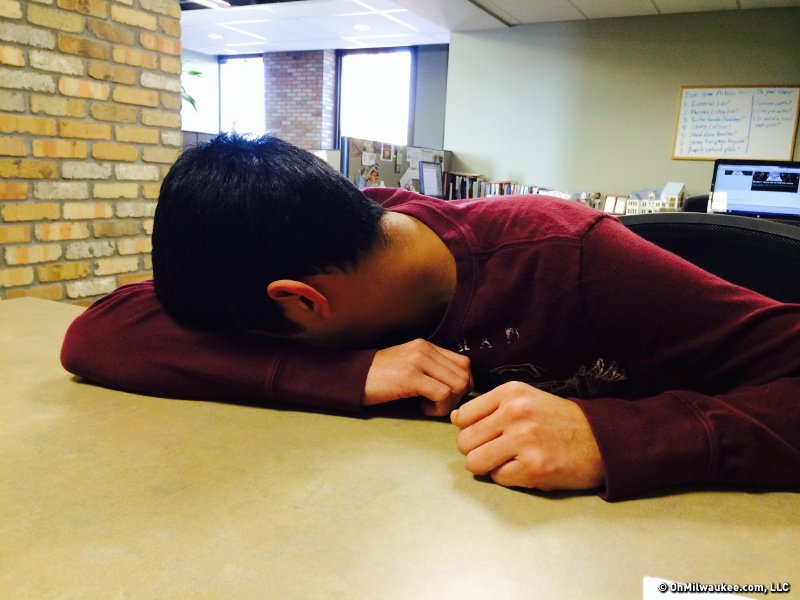Welcome to Healthy Living Week at OnMilwaukee.com! The resolutions are made, now the real work begins. But we're here to help get you – and keep you – on track with stories about medicine, diet, exercise, spiritual and emotional health, and more. Healthy Living Week is brought to you by Pairdd: easy gluten-free cooking at your fingertips.
Although diet and exercise are major parts of leading a healthy life, mental health is a key component as well. There are many forms of depression and millions of people are affected by it every day and taking steps to alleviate the effects of depression are integral to overall health.
Seasonal Affective Disorder (SAD) – also know as "winter depression" – is a real mood disorder that deeply affects some people when there is a change in season. It usually occurs right before or during winter, in part because there is less daylight and opportunity to spend time outdoors, but in rare cases, it is brought on by the onset of summer as well.
Although many Wisconsinites might find it hard to imagine, Eileen Teska says her mother-in-law suffered from SAD if she was exposed to too much light.
"She became manic when she spent too much time in daylight. She worked at night or inside under artificial light most of her life. After she retired and spent from dawn to sunset working in her garden, she was a different person in the summer," says Teska.
People who struggle with SAD might sleep too much, lack energy, feel blue or slump into a full-on depression. Winter-based SAD can be treated with light therapy, antidepressants, supplements and / or talk therapy.
After suffering a head injury at the age of 15, Kat Marvelli started to suffer from seasonal depression. At first, she did not realize her depression was triggered by the onset of winter, but her counselor noticed the pattern and relayed the insight.
"A light bulb went on over my head," says Marvelli. "I realized that in winter, generally, I feel ‘closed in’ and tend to get depressed. I was borderline suicidal - not sure how serious I was as I was a melodramatic teen – but I'd get very down and irritable."
To deal with her SAD, Marvelli says keeping herself busy is the best medicine. She also works out and takes Vitamin B12.
"These seem to have worked in recent years, but it's also helped that I've changed who I hang out with. Depression and self-respect are funny things: if you have little self-respect, you're more likely to be depressed and make bad choices," she says.
People who do not suffer from SAD sometimes have a difficult time acknowledging it as a "real" problem.
"Some people are very compassionate and sympathetic, but I'm certain some think I'm just trying to use it as an excuse, which was even more depressing when I learned that people I care about are too self-absorbed to consider the possibility that perhaps depression is the cause of some of my ailments and that a little supportiveness from those close to me would go a long way," says Marvelli.
Six years ago, Franzine Gies went to her annual gynecological exam and told the nurse practitioner about how she felt during the late fall / winter months.
"It seems to hit the worst when we change the clocks and I come home in the dark every day. I am not only down, but lethargic, as if I have to force myself out of bed in the morning or to leave the house except when absolutely necessary," says Gies. "It's almost a dulling of the senses for me. Like everything becomes grayer and I just get more listless."
Gies says her SAD lasts through March – basically until the clocks get changed again – but doesn’t totally go away until she can spend time outside for long periods of time again and tend to her gardening.
The nurse practitioner brought up the possibility of SAD and suggested to Gies that she try to get outside for at least 10 min a day and soak up the sun. However, she did not follow the suggestion because she doesn’t like feeling cold.
Instead, she has turned to travel.
"The only thing I've found that really works is traveling during the winter months. I've gone to Florida and come back feeling human again," says Gies. "I just soak up as much sun as possible."
Gies also took her son to a water park in the Wisconsin Dells and sat in front of the windows to soak up the winter sun which also helped, but not as well as going down South.
Recently, she found out she was Vitamin D deficient and has been on high doses of Vitamin D for about three weeks.
"I think I might feel slightly better," she says.
For Frankie Reed, the combination of a light box and acupuncture has improved her SAD. Reed uses the light box – which is a $30 Verilux Happy Light that she got on Amazon – as much as needed.
"The sun is shining today, so I'm OK. But when the days get gray and I can tell I'm feeling blue and low energy – I use the light for a little while," says Reed.
Acupuncture has worked even better for Reed. "It has really improved how I feel overall," she says.
It took several years for Tammy Kolbe to realize that she was suffering from SAD. Eventually, she noticed that her mood and behavior changed for the worse from January through April.
"I had low energy, bad sleep, anxiety, giving up and laying in bed all day reading. Basically, no energy or spirit at all. Instead, just feeling bad about myself and my life," says Kolbe.
Finally, her therapists suggested the possibility of SAD and she started taking prescription Vitamin D. She noticed improvements last winter, but this winter, not as much.
To combat her desire to stay in bed, Kolbe – who is a stay-at-home mom – schedules as many events as she can throughout the day to get her and her children out and about.
"I have done a lot of looking into this disorder and have found that many people in the north suffer. We just don't get enough sun in the warmer months to keep us year long," says Kolbe. "The most important thing of all is to realize that this can be dealt with pretty easily – the first step is to recognize that something is off and see a doctor."
Molly Snyder started writing and publishing her work at the age 10, when her community newspaper printed her poem, "The Unicorn.” Since then, she's expanded beyond the subject of mythical creatures and written in many different mediums but, nearest and dearest to her heart, thousands of articles for OnMilwaukee.
Molly is a regular contributor to FOX6 News and numerous radio stations as well as the co-host of "Dandelions: A Podcast For Women.” She's received five Milwaukee Press Club Awards, served as the Pfister Narrator and is the Wisconsin State Fair’s Celebrity Cream Puff Eating Champion of 2019.







